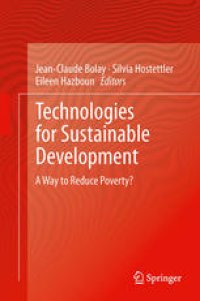
Ebook: Technologies for Sustainable Development: A Way to Reduce Poverty?
- Tags: Sustainable Development, Development Economics, Energy Policy Economics and Management
- Year: 2014
- Publisher: Springer International Publishing
- Edition: 1
- Language: English
- pdf
Whilst scientific research can be crucial in guiding innovation and development throughout the world, it can be too detached from real world applications, particularly in developing and emerging countries. Technologies for Sustainable Development brings together the best 20 papers from the 2012 Conference of the EPFL-UNESCO Chair in Technologies for Development with the aim to explore and discuss ways to link scientific research with development practices to assist practitioners and reply directly to social needs.
In order for technologies to be adopted it is not sufficient that they are low cost and affordable but also socially, culturally and environmentally accepted by the intended users. Technologies for Sustainable Development aims to explore and answer the following three questions:
• What is an appropriate technology?
• How can we ensure a sustainable, integrated development?
• What are the conditions for co-creation and transfer of such technologies?
Focusing on the importance of improving working relationships between stakeholders; researchers and decision-makers; between scientists and industrial sectors; between academics and the population; Technologies for Sustainable Development opens a dialogue necessary to create and implement the best solutions adapted to social demands.
Whilst scientific research can be crucial in guiding innovation and development throughout the world, it can be too detached from real world applications, particularly in developing and emerging countries. Technologies for Sustainable Development brings together the best 20 papers from the 2012 Conference of the EPFL-UNESCO Chair in Technologies for Development with the aim to explore and discuss ways to link scientific research with development practices to assist practitioners and reply directly to social needs.
In order for technologies to be adopted it is not sufficient that they are low cost and affordable but also socially, culturally and environmentally accepted by the intended users. Technologies for Sustainable Development aims to explore and answer the following three questions:
• What is an appropriate technology?
• How can we ensure a sustainable, integrated development?
• What are the conditions for co-creation and transfer of such technologies?
Focusing on the importance of improving working relationships between stakeholders; researchers and decision-makers; between scientists and industrial sectors; between academics and the population; Technologies for Sustainable Development opens a dialogue necessary to create and implement the best solutions adapted to social demands.
Whilst scientific research can be crucial in guiding innovation and development throughout the world, it can be too detached from real world applications, particularly in developing and emerging countries. Technologies for Sustainable Development brings together the best 20 papers from the 2012 Conference of the EPFL-UNESCO Chair in Technologies for Development with the aim to explore and discuss ways to link scientific research with development practices to assist practitioners and reply directly to social needs.
In order for technologies to be adopted it is not sufficient that they are low cost and affordable but also socially, culturally and environmentally accepted by the intended users. Technologies for Sustainable Development aims to explore and answer the following three questions:
• What is an appropriate technology?
• How can we ensure a sustainable, integrated development?
• What are the conditions for co-creation and transfer of such technologies?
Focusing on the importance of improving working relationships between stakeholders; researchers and decision-makers; between scientists and industrial sectors; between academics and the population; Technologies for Sustainable Development opens a dialogue necessary to create and implement the best solutions adapted to social demands.
Content:
Front Matter....Pages i-xxv
Front Matter....Pages 1-1
Technologies and Partnerships....Pages 3-9
Front Matter....Pages 11-11
The Role of Science, Technology and Innovation Policies and Instruments for a Paradigm Shift Towards Sustainable Development....Pages 13-19
New Vernacular Architecture as Appropriate Strategy for Housing the Poor....Pages 21-32
Computerization of Medical Consultation for Children Under Five Years of Age in Rural Areas of Burkina Faso....Pages 33-42
Field Investigations in Cameroon Towards a More Appropriate Design of a Renewable Energy Pico Hydro System for Rural Electrification....Pages 43-56
Ensuring Appropriateness of Biogas Sanitation Systems for Prisons: Analysis from Rwanda, Nepal and the Philippines....Pages 57-72
Technologies for Smallholder Irrigation Appropriate for Whom: Promoters or Beneficiaries?....Pages 73-84
Toward a New Approach for Hydrological Modeling: A Tool for Sustainable Development in a Savanna Agro-System....Pages 85-98
Rural Cold Storage as a Post-Harvest Technology System for Marginalized Agro-Based Communities in Developing Countries....Pages 99-112
Iron-Catalyzed Low Cost Solar Activated Process for Drinking Water Disinfection in Colombian Rural Areas....Pages 113-128
Appropriate Technology for Household Energy Access: The Case of the Centrafricain Stove in the Logone Valley (Chad, Cameroon)....Pages 129-140
Front Matter....Pages 141-141
Towards Sustainable Integrated Development? Partnerships and Systems....Pages 143-146
Innovation in Multi-Actor Partnerships: A Waste Management Initiative in Vietnam....Pages 147-158
Instrumental Participation in Serbia: Online Platform for the Dialogue about Public Spaces, Their Availability and Public Usage....Pages 159-170
Towards Sustainable Urban Livelihoods and Poverty Reduction in Gaza: The Role of Partnership and Appropriate Technology....Pages 171-183
Effect of Participation in ICT-Based Market Information Services on Transaction Costs and Household Income Among Smallholder Farmers in Malawi....Pages 185-195
Participatory Processes in Urban Planning Projects in China: The Example of Caoyang Village, Shanghai....Pages 197-207
On Fast Transition Between Shelters and Housing After Natural Disasters in Developing Regions....Pages 209-223
Front Matter....Pages 225-235
Research and Innovation for Sustainable Development....Pages 237-237
Front Matter....Pages 239-244
Appropriate Technology to Reduce Risks and Protect Assets: An Example from Development Cooperation in Bangladesh....Pages 237-237
Academic Cooperation to Foster Research and Advocacy Competences in the Occupied Palestinian Territory (West Bank)....Pages 245-261
Fog Collection Technology Transfer and Co-Creation Projects in Falda Verde, Chile and Tojquia, Guatemala....Pages 263-274
Role of Village Resource Centers in Technology Diffusion and Development....Pages 275-286
Back Matter....Pages 287-297
....Pages 299-303